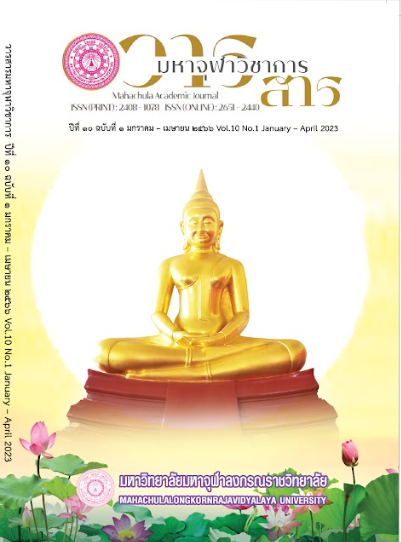An An analytical study of the dhamma attainments of the noble persons according to threefold training
Main Article Content
Abstract
In this research, there are three objectives: (1) to study the Dhamma attainments that were appeared in the Buddhist scriptures, (2) to study the noble persons (ariya-puggalas) who attain the Dhamma, and (3) to analyze the attainments of the noble persons according to Threefold Training. This paper is a documentary research.
The result of the research was found 1) that the Dhamma attainments in Buddhism is the enlightenment or the omniscience in the Four Noble Truths, because the person had listened to the Dhamma from the Buddha and his disciples, along with the practice of tranquility (samatha) and insight (vipassana) meditation until the person was enlightened as a noble person. 2) The noble persons who attained the Dhamma there are 8 persons who I attended to study such as Phra Sariputta Thera and Phra Ananta Thera, attaining at the Dhamma level of absolute nirvana achiever (arahant); Hattaka Alavaka and Cittakahapati, attaining at the Dhamma dhamma level of non-returner (Anagami); Isidatta and Sumana Devi, attaining at the Dhamma level of once-returner (Sakadagami); Anathapindika and Civaka Komarabhat, attaining at the Dhamma level of stream-winner (Sotapanna). 3) The Threefold Training (tri-sikkha) is (1) extreme study of precept (Adhisilasikkha) the way of organizing bodily and verbal behaviors in order; (2) extreme study of mind (Adhicittasikkha) the way of organizing the mind in a virtuous mood; and (3) extreme study of wisdom (Adhipanyasikkha) the practice of insight meditation in accordance with the principles of 37 qualities relate to awakening/understanding (Bodhipakkhiya dhamma) such as the 4 Foundations of Mindfuness (Satipatthana 4), the 4 right efforts (Sammappadhana 4), the 4 roads to power (Iddhipada 4), the 5 spiritual faculties (Indriyani 5), the 5 mental powers (Balani 5), the 7 factors of enlightenment (Bojjhanga 7), and the noble eightfold path (Ariyam atthangikam maggam) and using the three characteristics as the conceptual framework to encourage the attainment of the Dhamma.
Article Details

This work is licensed under a Creative Commons Attribution-NonCommercial-NoDerivatives 4.0 International License.
References
บรรยวัสถ์ ฝางคำ และคณะ. ชุมชนไตรสิกขา: รูปแบบและการเสริมสร้างคุณภาพชีวิตในสังคมผู้สูงอายุ จังหวัดอุบลราชธานี. มหาวิทยาลัยมหาจุฬาลงกรณราชวิทยาลัย วิทยาเขตอุบลราชธานี, ๒๕๖๑.
พระปลัดวิสุทธิ์ศรี นนฺทชโย (เทียนวิเศษ) และคณะ, การพัฒนาการเรียนรู้ตามหลักไตรสิกขาของนักศึกษาวิทยาเขตศรีธรรมาโศกราช จังหวัดนครศรีธรรมราช, วารสารพุทธสังคมวิทยาปริทรรศน์, ปีที่ ๕ ฉบับที่ ๒ (กรกฎาคม – ธันวาคม ๒๕๖๓) : ๓๐.
พระพรหมมังคลาจารย์ (ปัญญานันทภิกขุ). อริยสัจ ความจริงอันประเสริฐ ๔ ประการ. กรุงเทพมหานคร: ธรรมสภา, ม.ป.ป.
พระภาวนาพิศาลเมธี วิ. (ประเสริฐ มนฺตเสวี). วิปัสสนาเพื่อความดับกรรม. กรุงเทพมหานคร: ห้างหุ้นส่วนจำกัด ประยูรสาส์นไทย การพิมพ์, ๒๕๖๒.
พระโสภณมหาเถระ (มหาสีสยาดอ) รจนา, พระพรหมโมลี (สมศักดิ์ อุปสโม ป.ธ.๙, M.A., Ph.D.) ตรวจชำระ, พระคันธสาราภิวงศ์ แปลและเรียบเรียง. ปฏิจจสมุปบาท เหตุผลแห่งวัฏสงสาร. กรุงเทพมหานคร: ห้างหุ้นส่วนจำกัด ประยูรสาส์นไทย การพิมพ์, ๒๕๕๔.
พุทธทาส อินทปัญโญ. พุทธวิธีชนะความทุกข์. กรุงเทพมหานคร: บริษัทพิมพ์ดี จำกัด, ๒๕๕๖.
________. พุทธทาส อินทปัญโญ. แก่นพุทธศาสน์. กรุงเทพมหานคร: บริษัท วี.พริ้นท์ (๑๙๙๑) จำกัด, ๒๕๕๖.
มหาจุฬาลงกรณราชวิทยาลัย. พระไตรปิฎกภาษาไทย ฉบับมหาจุฬาลงกรณราชวิทยาลัย. กรุงเทพมหานคร: โรงพิมพ์มหาจุฬาลงกรณราชวิทยาลัย, ๒๕๓๙.
________. อรรถกถาภาษาไทย ฉบับมหาวิทยาลัยมหาจุฬาลงกรณราชวิทยาลัย. กรุงเทพมหานคร: โรงพิมพ์มหาจุฬาลงกรณราชวิทยาลัย, ๒๕๕๖.
ธีรยุทธ์ พึ่งเทียร และคณะ. การสงเคราะห์งานวิจัยแนวทางการเรียนรู้ตามหลักไตรสิกขา. คณะครุศาสตร์ มหาวิทยาลัยมหาจุฬาลงกรณราชวิทยาลัย, ๒๕๔๖.
วัลโปละ ศรี ราหุล ตรีปิฏกวราจารย์. พระธรรมที่พระพุทธเจ้าทรงสอน. กรุงเทพมหานคร: กองทุนบุญนิธิหอไตร, ๒๕๔๙.


